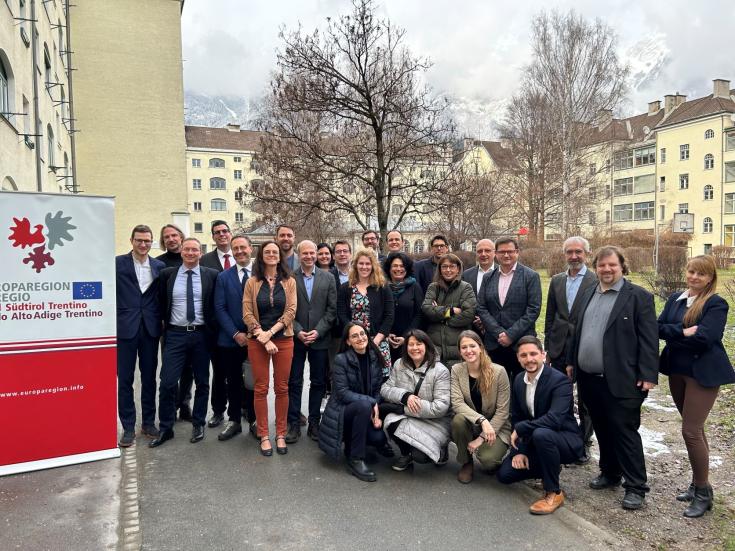Boosting sustainable cross-border mobility

On 19 and 20 January 2023, the Policy Learning Platform organised an onsite peer review for the benefit of the Euregio Tyrol - South Tyrol - Trentino (EGTC) in Innsbruck, to address the policy challenge of “Boosting sustainable cross-border mobility”.
Current state of affairs
In the context of the new generation of the Cohesion Policy and the European Territorial Cooperation programmes, the EGTC is called to play an important role in:
- Identifying the obstacles to cross-border cooperation on its territory
- Proposing projects positively affecting the Euregio, with a particular focus on governance approaches for improved sustainable mobility.
Considerable work has already been carried out thanks to the active participation of the beneficiary organisation in the EU macro-regional strategy for the Alpine region (EUSALP).
Also at the local level, several measures for improving local cross-border mobility services are already in place. However, the EGTC wished to go deeper in looking into other cross-border realities in Europe, to get inspiration for further improvements in their local context.
Peers from across Europe
Under the moderation of Thorsten Kohlisch, Project Manager of the Policy Learning Platform, and Elena Ferrario, Thematic Manager of the Policy Learning Platform, six excellent peers took part in the peer review:
- Michael Déjoze, Euregio Maas-Rhein (Belgium, Netherlands, Germany)
- Dr. Jürgen Neumüller, Oder-Partnership (Germany, Poland)
- Jürgen-Peter Hiller, Oder-Partnership (Germany, Poland)
- Steffen Schönicke, Euregio Egrensis (Germany, Czech Republic)
- Sandra Sodini, EGTC Senza Confini (Italy, Slovenia)
- Werner Schreiner, Government of Rhine-Palatinate, Germany
Recommendations
Based on the fruitful exchange between peers, the beneficiary organisation, and local stakeholder representatives, a number of recommendations were drafted.
The participants discussed the following points, showcasing successful examples that could be of inspiration for the Euregio.
-
- Build trust among policy makers and among technicians: EGTC can play a key role as an intermediary between policy makers and technicians, by embedding cooperation in the governance structures and coordinating between political/strategic and operational levels (“the glue”)
- Ensure political agreement backing permanent CBC consultation mechanisms
- Make sure that cooperation should be win-win for all parties
- Link cross-border elements to national and regional priorities
- Make cross-border cooperation mandatory for mobility actors
- Create thematic working tables + necessary structures for continuity
- Take the most pragmatic approach to overcome legal challenges
- Lobby for the current revision of EU legislation (TEN-T) – secondary network
- Give the project higher visibility to make it “crispy” for politicians
- Know your target groups for better planning: understanding the needs of the territory is essential to plan successfully at cross-border level. Territorial impact assessment can be a tool to highlight people’s needs and make informed decision making. Also, interactive maps can visualise the need for connections/investments and keep the projects on the political agenda.
- Give high visibility to flagship projects, with branding and marketing strategies.
- Integrated ticketing and tariffication are very strong measures for successful cross-border mobility.
- Reinforce touristic and cultural offers – low-hanging fruits can be a good trigger for developing further offers
- Consider developing on-demand transport on the whole cross-border area, as a good complementary service for specific parts of the territory and target groups.
The host’s policy challenges and all the peer suggestions can be found in the follow-up report attached.
Peer review report on boosting sustainable cross-border mobility
Peer review report on boosting sustainable cross-border mobility
Apply for a peer review!
Submit your peer review application today and find solutions to your policy challenge with our experts and peers!

